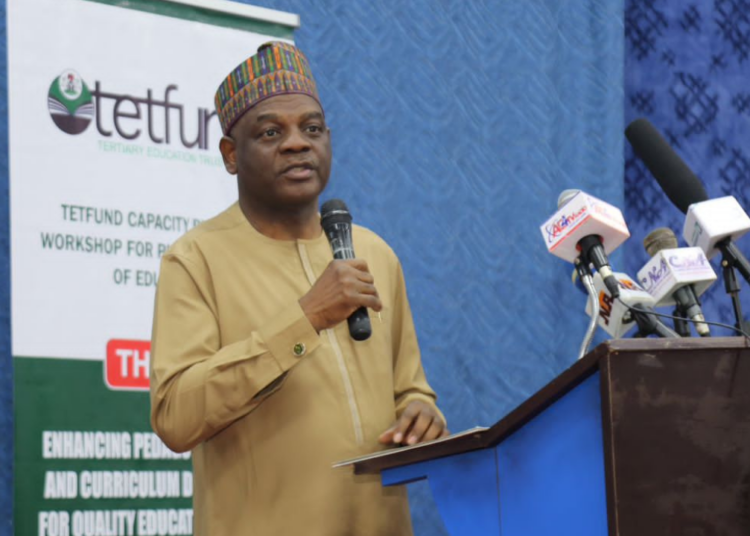The need for a skilled workforce equipped with practical, technical expertise has become a central focus in Nigeria’s quest for sustainable economic growth and development.
Recognising the importance of equipping the youthful population with industry-ready skills, the Tertiary Education Trust Fund (TETFund) has renewed its commitment to strengthening technical education across the country.
With a strong focus on bridging the gap between academic training and practical application, TETFund is working to ensure that Nigeria’s tertiary education institutions remain at the forefront of addressing the country’s growing demand for skilled professionals.
In this regard, the Fund recently signed a Memorandum of Understanding (MoU) with the Academy of Engineering to bridge skills gaps in the country.
The Executive Secretary of TETFund, Arch. Sonny Echono, at the signing of the MoU in Abuja, said the time has come for Nigeria to do something about technical education.
Echono noted that over time, Nigeria has come up with several policies on TVET, trying to encourage technical education by prioritising it, even in terms of job admissions.
“If you go around our campuses and our institutions, it would not be wrong to say that all these years we’ve been paying lip service to the idea of promoting TVET. Why do I say that? Our polytechnics, which are intended to be the pillars of TVET in this country, many of them are offering courses that have no bearing on TVET.
“The laboratories, the workshops that they have, you see obsolete equipment. Many do not have the requisite technical staff to man these facilities. We are still grappling with the issue of power and ensuring that production can take place and teaching and learning can happen.
“And even in our universities, again, recently, Mr. President had to make the remark: how can we sustain learning in the modern age if the basic facilities for research are not in place? So, it’s a big challenge before us.
“And I’m glad that all the professional bodies, all the experts, and the apex body in the engineering field, the Academy, are now taking it as a challenge to ensure that, first, we position technical education in this country; and second, that we map out the skills gap, identify the various areas where we require the skills to support the professions,” he said.
According to him, there is currently an effort ongoing at the request of the Honourable Minister of Education for a national skills gap assessment. “I’m told from the preliminary work they have done, there are more than 13 different fields and vocations where Nigeria has less than 10% to 15% of the required workforce.
“So when we are talking about shortages, we’re not only talking about doctors and lecturers who are applying and all that. We are also talking about very critical sectors. And part of the reason is because the facilities are not here.”
He noted that there are many faculties of engineering at universities and polytechnics all around the country, saying the time is right now to take these critical steps.
“And I’m glad this government is focusing on that. I am pleased to inform you that a significant part of our just-grouped 2025 intervention guidelines includes a significant provision for the promotion of students.
“And the NBTE, which is also represented on our board and leading our effort in this regard, is reviewing curricula, ensuring that our polytechnic graduates don’t only leave with certificates, but also certification in particular skills,” Echono said.
The TETFund Boss further emphasised that it is partnering with the private sector, including the informal sector, pledging its total support.
“When you go to Panteka or Computer Village, we want to be able to ensure that these informal sectors have the intellectual and technical support they require to produce, to scale the manpower needs that we have, or that we require to service the necessary sectors in our economy.
“This MoU signifies the framework for us to collaborate in multifaceted fields in the areas of TVET, and we shall go forward, intensifying efforts to ensure that we tackle the challenge of hearing things in the media about Nigerians not contributing enough to the development of our country. We are not going to take offense. We will sit down and work to ensure that we put an end to some of these statements.
“That is the way to respond. And I believe that with the support of the rest of our country, with the active support of all the agencies involved, including the legislature and the executive branch, we will get there. So, I thank you for coming, and I welcome you to the signing ceremony,” he added.
President of the Nigerian Academy of Engineers, Engr. Rahamon Adisa Bello, described the event as a historic one and the beginning of the way forward toward bringing together all agencies and professional bodies that have roles to play in assisting the government in entrenching Technical and Vocational Education and Training (TVET) activities.
“When we talk about the availability of professionals for development, the death of technicians and artisans is obvious and needs to be reversed and urgently filled up.
“But it is important to note that the federal government of Nigeria has commenced the process of reawakening this through the recent launch of the National Skills Qualification Framework (NSQF), and the inclusion of the National Skills Qualification that was sworn to cease into the scheme of service in Nigeria.”
He said a lot of support is required from all concerned to maintain and increase the tempo through realigning and co-opting efforts, as they are doing today, to change the appropriate state-by-state requirements for the objectives to be realized and keeping both the federal and sub-national governments on their toes in fulfilling their roles.
“The resourcing of both the formal and informal in-car and vocational education and training is key. While the NSQF, through the formation of Central Skills Councils, aims to assist informal and non-governmental training, the realization of formal training in schools is very, very urgent. This will be one of the major tasks for the General Collaboration Committee that we will be setting up after this summit this year.
“There’s the need to brainstorm and come up with state-by-state strategies for accelerating the reintroduction. The task ahead is daunting, but I believe with the commitment shown today, by all agreeing to come together, we can make a big difference in a very short time,” he added.
Also speaking, the President of the Nigerian Society of Engineers (NSE), Engr. Margaret Oguntala, said the signing of the MoU would chart the path forward for the growth of the technical industry using the technical skills that already exist.
“And of course, it’s also important that we drive TVET with all intention and be deliberate about it. Because indeed, as engineers and members of the Nigerian Society of Engineers, we have also realized the fact that there is a real need to resuscitate and revamp technical schools and technical education. So on this note, I’d like to thank the Executive Secretary again for this opportunity.”




